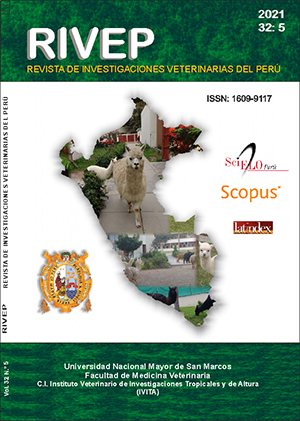The fasting and refeeding strategy, a viable alternative for optimising the consumption of balanced feed in the semi-intensive farming of white shrimp Litopenaeus vannamei
DOI:
https://doi.org/10.15381/rivep.v32i5.19546Keywords:
shrimp, penaeid, compensatory growth, feed restriction, fatteningAbstract
The aim of this study was to determine the effect of two or three days of fasting per week with an increase of 20% in the post-fasting ration on growth, survival, biomass, feed consumption and relative conversion factor (FCR) of Litopenaeus vannamei shrimp grown in the laboratory at a density equivalent to that of a semi-intensive system. The experiment was carried out in nine aquariums with 90 L of brackish water, each with eight shrimp weighing approximately 5.5 g (25 specimens/m2). The shrimp were fed twice a day, then the food residues, feces and exuviae were removed. The feed dosage was set according to a commercial table and adjusted according to the consumption of the previous day. Growth (average weight, weekly weight increase, percentage weight gain), survival, biomass, feed consumption and relative growth factor - FCR were evaluated for nine weeks. The shrimp fasting two days a week and increasing the post-fasting ration by 20% maintained a statistically similar weight and biomass to that of shrimp without fasting, achieving a saving of 27.4% in the feed supplied and a better FCR (1.18 vs. 1.52). Shrimp fasting three days a week had a significantly lower average weight and lower biomass, although their savings in feed consumption and their FCR were better than the other two treatments. Survival was 100% in all treatments. It is concluded that a two-day weekly fasting with a 20% increase in the post-fasting ration is feasible to optimize the use of balanced food in the culture of Litopenaeus vannamei at a density equivalent to that of a semi-intensive culture.
Downloads
Downloads
Published
Issue
Section
License
Copyright (c) 2021 Junior Jair Castro Morán, Alberto Ordinola-Zapata

This work is licensed under a Creative Commons Attribution 4.0 International License.
AUTHORS RETAIN THEIR RIGHTS:
a. Authors retain their trade mark rights and patent, and also on any process or procedure described in the article.
b. Authors retain their right to share, copy, distribute, perform and publicly communicate their article (eg, to place their article in an institutional repository or publish it in a book), with an acknowledgment of its initial publication in the Revista de Investigaciones Veterinarias del Perú (RIVEP).
c. Authors retain theirs right to make a subsequent publication of their work, to use the article or any part thereof (eg a compilation of his papers, lecture notes, thesis, or a book), always indicating the source of publication (the originator of the work, journal, volume, number and date).



